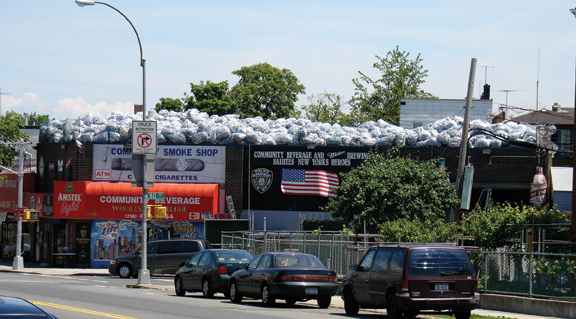The Bottle Bill has been in effect for almost 30 years in New York State. What have been its successes and where has it failed and with New York States’ recycling law is it still necessary to redeem bottles and cans?
In 1983 the New York State Bottle law went into effect thus putting a 5-cent deposit on all soda and beer containers sold in the state. This was a response to the growing problem of beer and soda containers littering the streets, parks and waterways and to the problem of reducing the amount of trash going into the landfills. In 2009 Governor Patterson signed into law the Bigger Bottle Law, which expanded the old law to include water bottles and sport drinks, proponents wanted all juice drinks and ice tea included but couldn’t get it passed. They also wanted to change the deposit to 10 cents but that too was rejected.
In the good old days beer and soda bottles were returned to the store to be reused over and over again, industry estimates were that a bottle was reused 20 times or more. In the 50s and 60s beverage companies started using cans which couldn’t be refilled and bottles came in many sizes to add variety and we were becoming a throw-away society and it became costly for big companies to reuse bottles. By 1970 most beer and soda containers were thrown away. Today Sam Adams Beer is the only company that reuses their bottles.
As a young boy in the 50s and 60s my friends and I used to go what we called “bottle hunting” then like today there were those who didn’t care about the money or were too lazy to return the bottle. We would go to spots like the parks where lots of people gathered and the industrial sections of Maspeth where the workers just threw their bottles away after lunch. We would take the empties to the store and get 2 cents for a small bottle and 5 cents for a large and with our earnings we either went to the movies or bought more soda and candy or maybe a pack of baseball cards. Sometimes if we did an errand for a neighbor our pay was a bag of empty bottles.
The late sixties and early seventies environmentalists became concerned with the problems of pollution and the wastes society was creating and the dilemma of what to do with all these materials once we were finished using them. Bottles and cans were becoming a big problem because it littered our cities and wilderness areas and people wanted the government to do something. Public service announcements on television were used, my favorite was one with a Native American on his horse looking at a stream and a tear comes to his eye when he sees all the litter. The city also did ads on the buses and subways saying, “Don’t be a litter bug” along with billboards along highways that said “ Keep America Beautiful.” These ads were good intentioned but the problem was too big to be solved with a slogan.
Environmental groups wanted the city to start recycling its garbage but that wouldn’t come for many years. In the mean time local groups set up recycling centers in neighborhoods all over the city. My friends and I started collecting newspaper, bottles (separated by clear and colored glass) and cans (aluminum and steel). When we had a big load we would load my van up and take it all down to a recycling center in Elmhurst and their group used the earnings to plant trees. All of this involved a lot of work, hauling the materials and crushing the cans and bottles and it only affected a small amount of the city’s garbage.
I was involved in environmental groups in the 70s and for 10 years the Bottle Bill kept being defeated even though we argued that it would reduce litter & solid waste, save energy, preserve our natural resources, cut down costs to the government and create jobs. Oregon was the first state to have a bottle law in 1971 and it was shown to reduce litter on its highways and solid waste in general other states followed their lead. New York became the ninth state to get on-board. Today there are 11 states with deposit laws. Delaware repealed its law in 2010.
We heard the arguments from the opponents of the bill, the beverage industry as well as the grocery stores from big supermarkets to small candy stores and delicatessens had good arguments. They felt they were in business to sell food not store garbage and they would have to devote precious space for the empties and hire more workers but it seemed like the benefits out weighed their inconveniences and costs. That was until New York State adopted the Recycling Law in 1988. However, I think it’s time we reconsider the value of the recycling program and the Bottle Deposit Law.
New York has a great recycling program, we have Sanitation trucks that come to our houses and remove our garbage each week. What could be better than that? It doesn’t make sense anymore to have consumers returning bottles and cans to stores. It’s a waste of our time and energy and an added cost on the beverages we buy and a great hardship especially on seniors and the handicapped.
There is also a hardship and cost on storeowners who have to make room to handle deposits and hire extra help and they have to deal with infestations of insects and rodents. It doesn’t make sense to bring back dirty bottles and cans that have been lying in the gutter and keep it in a store where we buy our food. When I walk around I see the clear bags with the recyclables and I see many people are throwing away their deposits, either they don’t want to be bothered or it’s a hardship. This has started a whole group of people that collect cans and bottles by going through our garbage. Who hasn’t been startled by someone in their yard or by someone opening up the trash at the curb? This has almost become a reason to keep the deposit law, because it gives people who need money, many times the poor and homeless, a job. I’m sure there are many surviving on the income they make. I even met a man who said he goes to Italy ever year on the money he makes from collecting. I’ve also seen the mess they can make by turning over garbage cans in parks and on the beach to get a can and leave the garbage on the ground. Also many collectors don’t pick up bottles because they get too heavy. The best reason is, do you want to get behind someone with a mountain of cans at the deposit machine and wait?
New York State is losing money because there are those who will buy beer and soda in New Jersey and even take back the empties and get the deposit in New York. At my local distributor there are no machines to read the UPC code so they just take them back. Michigan has a 10-cent deposit and also has a $100 fine if you are caught trying to cash a no deposit can or bottle. In 2000 it was estimated that there was $107 million in unclaimed deposits in NY alone. That means many people aren’t bothering and that is costly to all of us. One of the biggest arguments for the Bottle Law is that it reduces litter and I’m sure it does but what about New Jersey, which doesn’t have the law? I‘m in New Jersey quite often and I don’t see bottles and cans littering the streets, highways and beaches but they do have a recycling program.
So much more should be done to expand the recycling program. Schools should be teaching the importance of recycling to our young children; right now schools don’t separate waste. Recently I noticed that La Guardia College in Long Island City has separate bins in the hallways. Why not have separate bins for trash and bottles on the streets and parks and in businesses. This summer I noticed separate bins on the boardwalk on Rockaway Beach and in some parks. That means we are moving in the right direction.
How about bringing back the leaf recycling program, which was a victim of budget cuts a few years ago. New York has millions of trees and doesn’t it make sense to take those leaves to make mulch and compost for our parks and gardens instead of hauling them to landfills out of state. I’ve had a compost bin which I got at a low cost from the city in my yard for more than 30 years and all my fruit and vegetable scraps have gone back in to my garden.
If reducing the litter on our streets, parks and beaches is the goal of the proponents of the bottle law I say there are those who will throw out bottles and cans no matter what the deposit. To prevent broken glass maybe only make beer in cans although some beer drinkers might oppose that. I’ve heard people say they live in small apartments don’t have the room or are afraid of attracting bugs. If creating jobs is one of the benefits, I say good, create jobs keeping our streets and parks clean but not by those that go into people’s yards and go through their garbage, which by the way is against the law, and then bring those filthy cans back to the stores where we buy our food.



